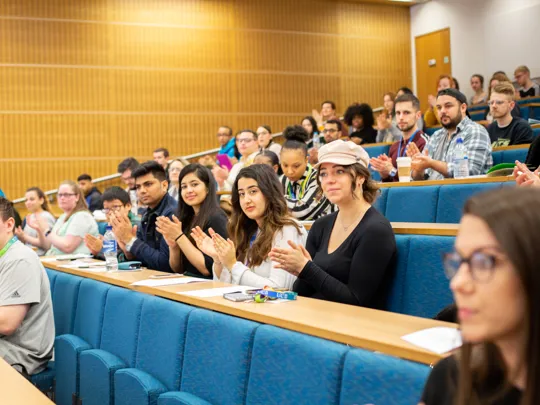Why choose this apprenticeship?
- PROFESSIONAL RECOGNITION – Achieve a qualification aligned with Social Work England standards, enabling you to register as a professional social worker.
- BOOST YOUR SKILLS – Develop the knowledge, values and skills needed to make informed decisions and deliver high-quality support to individuals, families, and communities.
- Career Progression - Prepare for a successful career with opportunities to progress into senior, specialist or managerial roles, supported by a commitment to ongoing professional development.
- EARN A WAGE – Apprentices are classed as employees, which means getting paid while gaining valuable work experience. You'll be learning while applying new skills in a real working environment.
- AWARD-WINNING UNIVERSITY - Study at a university voted by students as having the best support in the region at the Whatuni Student Choice Awards 2024
Our facilities
Learners on our Social Work Apprenticeship programme have access to our wide variety of learning spaces, ensuring you have the right environments to build your knowledge, from lecture theatres to interactive group working spaces and extensive library resources.
Within the School of Health, Life Sciences and Education, we have access to a range of simulation facilities, which enable our learners to gain vital experience of a range of settings you are likely to encounter in the field of social work.
Course breakdown
- Year 1
- Year 2
- Year 3
Core modules
Introduction to Professional Social Work Practice
This module introduces you to the core values, expectations, and responsibilities of the social work profession. You will explore how social work has evolved over time in response to political, social, and cultural change, and begin to understand its role in promoting justice, rights, and wellbeing. You will consider what it means to be a professional social worker and explore the ethical, legal, and regulatory frameworks that support safe, inclusive, and accountable practice. You will be introduced to Social Work England’s Professional Standards and begin developing your understanding of the knowledge, skills, and behaviours you will be expected to demonstrate throughout the course. Through reflective activities and work-based learning, you will begin to shape your professional identity, build confidence in your communication, and understand the importance of supervision, self-awareness, and professional conduct. The module will support you in making meaningful links between academic learning and real-world social work practice.
Skills for Social Work and Relationship-Based Practice
In this module, you will develop the core skills needed to build meaningful, professional relationships in social work. You will explore how to communicate effectively, listen with empathy, and respond to complex emotions in ways that are ethical, inclusive, and person-centred. You will learn about relationship-based practice and consider how trust, boundaries, and self-awareness shape your work with individuals, families, and professionals. Through interactive activities, reflective exercises, and group discussions, you will build confidence in applying your skills in real-world situations. As part of this module, you will complete a series of activities designed to demonstrate your readiness for practice. This will include participating in a group discussion exploring the professional standards, undertaking a direct observation, and submitting a short reflective piece. These activities will help you consolidate your learning and build confidence as you prepare for your first practice placement in Year 2.
Social Work, Social Justice and Lived Experience
In this module, you will explore what social justice means in social work and why it matters. You will examine how inequality, discrimination, and oppression impact people’s lives — and how social workers can promote equality, inclusion, and human rights. You will learn directly from people with lived experience of social work services, who will share their stories and help you to understand the real-world impact of social work practice. Their insights will support you to reflect on the role of power, identity, and structural disadvantage in influencing outcomes. You will be introduced to key theories that underpin anti-oppressive, anti-discriminatory, and anti-racist practice — including intersectionality, the PCS model, labelling theory and Social GRACES model. These theoretical perspectives will help you understand how identity and social context shape experiences, and how social workers can respond in ways that promote fairness, challenge injustice, and empower individuals and communities. Throughout the module, you will also begin developing your communication and engagement skills, with a focus on empathy, respect, and inclusive relationship-building. This will support you to build confidence in working alongside others in a way that reflects core social work values. The module will help you connect your values to your practice and prepare you to support people with care, dignity, and compassion.
Human Growth and Life Course Development
In this module, you will explore how people grow, change, and develop across the life course — from infancy through to older adulthood. You will examine how relationships, family, culture, and wider social factors influence how individuals experience different stages of life. You will be introduced to key theories and frameworks used in social work to understand human development and behaviour. You will also consider the impact of trauma, abuse, and social adversity on wellbeing, and how social workers can respond in ways that are inclusive, strengths-based, and person-centred. You will reflect on how deficit-based approaches can overlook individual strengths and social context and consider how grounding your practice in lived and living experience can support more inclusive and values-led social work. By connecting theory to real-world settings, this module will help you build confidence in using knowledge to inform your work with individuals, families, and communities.
Core modules
Applying Social Work Law and Social Policy
In this module, you will explore how legislation and social policy shape the role and responsibilities of social workers in England. You will learn how key legal frameworks guide decisions, protect rights, and support safe, ethical practice across both children’s and adult services. You will examine a wide range of laws and policies — including those related to safeguarding, mental health, capacity, and human rights — and learn how to apply them in real-world social work scenarios. You will also consider how national and local policy decisions impact the lives of people who use services, particularly those experiencing disadvantage or discrimination. This module will help you to build confidence in navigating complex legal and ethical issues in practice. Through case studies, interactive learning, and reflective discussion, you will develop the legal literacy and critical thinking needed to advocate for people’s rights, promote social justice, and make defensible decisions in your professional role.
Social Work Intervention and Safeguarding
In this module, you will build the knowledge and confidence to identify, assess, and respond to safeguarding concerns involving children, families, and adults. You will explore the legal and professional frameworks that guide safeguarding practice and learn how to apply these in your practice. You will examine how social workers work with others to protect people from harm, abuse, and neglect — including through risk assessment, safety planning, and multi-agency interventions. You will also consider how social workers balance competing duties, uphold rights, and make decisions that are ethical, defensible, and trauma-informed. Learning will include national safeguarding guidance and reflections from Child Safeguarding Practice Reviews and Safeguarding Adults Reviews. You will take part in scenario-based exercises, group discussions, and inter-professional learning that will prepare you for working in safeguarding practice.
Contemporary Issues in Social Work Practice
In this module, you will explore some of the most pressing and complex issues facing social work today. You will consider how changing social conditions, policy developments, and lived experiences influence and shape the challenges that individuals and communities encounter — and how social workers can respond in ethical, informed, and inclusive ways. You will examine a range of contemporary themes such as digital and AI technologies, mental health, poverty, housing, youth justice, migration, and substance use. You will also explore how online harms, education, honour-based violence, and other social issues intersect with safeguarding and social justice. You will be encouraged to think critically about how social policy influences the realities of practice and how social workers can advocate for change. This module will help you deepen your understanding of the diverse and evolving contexts in which social work takes place — and strengthen your confidence in applying knowledge to real-world practice.
Theory into Practice: Skills and Methods
In this module, you will explore the theories, skills, and methods that underpin effective social work practice. You will build on your earlier learning and develop greater confidence in applying knowledge to real-world situations — supporting, protecting, and empowering people across different settings. You will examine a range of approaches including person-centred, strengths-based, solution-focused, cognitive behavioural therapy (CBT), motivational interviewing, attachment theory, systems theory, and more. You will also explore restorative and systemic practice as ways to build collaborative relationships and support positive change. Through interactive learning, group discussion, and skills-based tasks, you will deepen your understanding of how theory informs social work practice and reflect on the values that guide your interventions. This module will help you to become more confident and critically reflective in your direct work with individuals and families.
Social Work Practice (practice learning placement 1)
This module is the first of two assessed placements you will complete as part of the BA (Hons) Social Worker Apprenticeship Degree. It includes 85 days of supervised practice, which may involve time spent in your usual work setting and a contrasting placement. Your local authority will work closely with the university to ensure your placement arrangements meet the practice requirements set by the regulator. You will have the opportunity to apply theory, research, and values in real-world settings, working directly with individuals and families. Throughout your placement, you will engage in supervision, receive feedback, and reflect on your development as a practitioner. This module will help you build confidence, skills, and professional judgement in line with the Knowledge, Skills and Behaviours (KSBs). Your progress will be recorded through a structured Practice Learning Portfolio, which includes direct observations, reflective accounts, supervision records, and feedback from your practice educator.
Core Modules
Contemporary Social Work and Inter-Disciplinary Practice
This module focuses on the vital role of inter-disciplinary practice in contemporary social work. You will reflect on your role within multi-agency settings and build on your existing communication skills to strengthen your confidence in partnership working and collaborative decision-making. You will take part in shared learning activities with learners and professionals from other disciplines (including guest speakers), explore real-world case examples from your practice placement, and reflect critically on the strengths and challenges of partnership working. Key themes include communication, negotiation, supervision, leadership, and managing professional boundaries. By the end of the module, you will have developed a stronger understanding of your professional role within inter-agency contexts and the confidence to navigate complex situations with clarity, accountability, and compassion.
Using Evidence to Inform Practice
This module introduces you to the role of research, theory, and other forms of evidence in shaping professional social work practice. You will be encouraged to develop a critical approach to understanding how knowledge is generated, interpreted, and applied, and how evidence supports informed decision-making in complex and evolving practice environments. You will explore a range of evidence that informs social work, including academic research, lived experience, professional knowledge, and theoretical frameworks. You will learn how to locate, interpret, and critically assess different forms of evidence, and consider how these can be used to inform your work with individuals, families, and communities. Throughout the module, you will be supported to build confidence in using research and theory to inform and evaluate your practice. The knowledge and skills developed will support your application of evidence-informed approaches during your practice placement, providing opportunities to critically reflect on how theory and research translate into real-world social work.
Readiness for Social Work Practice
In this final module you will have the opportunity to consolidate your learning across the programme and reflect critically on how you apply knowledge, skills, theory, and values in social work. You will explore your professional identity, examine your role within organisational and policy contexts, and evaluate the impact of your interventions with individuals and families. Throughout the module, you will be encouraged to think critically about your practice and use evidence, research, and ethical frameworks to support your decision-making. You will consider current issues in social work to strengthen your understanding of your professional responsibilities in promoting inclusion, justice, and positive outcomes for the people you support. You will also be supported to plan for your ongoing development as you prepare to enter the profession as a qualified social worker. This includes reflecting on your learning journey, identifying strengths and areas for development, and considering your role as a reflective and accountable practitioner, as you move into your Assessed and Supported Year in Employment (ASYE).
Social Work Practice (practice learning placement 2)
This is your final assessed placement as part of the BA (Hons) Social Worker Degree Apprenticeship. It includes 100-days of supervised practice, which may involve time spent in your usual work setting and a contrasting placement. Your local authority will work closely with the university to ensure your placement arrangements meet the practice requirements set by the regulator. You will apply theory, research, and values in real-world settings, working directly with individuals and families. Through regular supervision and feedback, you will reflect on your development and build the confidence, skills, and professional judgement needed in line with the Knowledge, Skills and Behaviours (KSBs). Your progress will be recorded in a structured Practice Learning Portfolio. This includes direct observations, reflective accounts, supervision records, and feedback from your practice educator, helping you to evidence your readiness to practise as a qualified social worker.
Key information
Entry requirements
Applicants should have a period of experience determined by employer partners, typically this is two years sector experience – however, anything from six months experience will be accepted in line with other social work programmes.
- Candidates will need to have GCSE English at Grade C/4 or higher or equivalent such as Functional Skills Level 2.
- To accept an International English language testing system (IELTS) qualification, certificates must show the academic version of the test and an overall score of at least 7.0 (SWE, 1.1).
- that you took the full academic version of the test, which is based in a test centre
- that you achieved an overall score of at least 7.0
- the original stamp and test report form number
- that you received your IELTS qualification in the last five years
We cannot accept:
- the general test
- the IELTS online
- the online indicator test
- IELTS one skills retake
Successful applicants will need to have a contract of employment in place that covers the duration of the apprenticeship agreement with the employer.
Successful Disclosure and Barring Service (DBS) and Occupational Heath checks to be completed prior to commencing on the programme. Apprentices are employees and should therefore have a DBS already in place. Learners will require a full DBS at ‘enhanced level’ which covers both children and vulnerable adults and where learners are not subscribed to the updated DBS service, an updated DBS will be required.
Admissions processes will assess the suitability of applicants, including in relation to their conduct, health and character.
If you are an international student, you must meet residence requirements and have existing right to work in the UK. We are unable to sponsor a Student Visa for this programme.
Teaching and assessment
A minimum of 20% of the apprenticeship learning will take place outside of the workplace – this is known as ‘off-the-job’ training. This off-the-job training will be delivered one day a week and will be delivered by the University (provider) through a hybrid teaching model.
Blended learning in an apprenticeship integrates various learning methods to create a comprehensive and flexible training experience. This approach combines face-to-face, in-person teaching with digital learning components, incorporating both synchronous and asynchronous methods, as well as self-directed learning.
In-person, face-to-face teaching remains a fundamental aspect of an apprenticeship, providing hands-on training, support and direct feedback from experienced professionals. This component allows apprentices to develop practical skills, observe best practices and receive immediate guidance within an educational setting.
Each model embeds a blended approach to include lectures, seminars, tutorials, practical sessions, skills days workshops, use of digital technology, simulated learning activities, reflective practice and contemporary debates.
On-the-job training
The other 80% of the week is spent in on-the-job training, where practice learning opportunities are provided by the employer that allow apprentices to apply their knowledge and demonstrate their values and skills in the work setting.
Assessment
Our approach to teaching, learning and assessment is focused on encouraging apprentices to explore, challenge and investigate the world around them, using innovative approaches, simulated real world scenarios, real life role plays and the use of virtual reality and applied digital technologies.
Assessments have been developed with key stakeholders, including experts by experience, carers and employers. Assessment tasks may include case studies, written work, presentations and portfolios.
- Coursework 100%
Our programme is mapped to Social Work England Professional Standards, Social Work England’s Knowledge, Skills and Behaviours, Social Work Apprenticeship Standard.
Our teaching and assessment is underpinned by our Learning and Teaching Strategy 2025-2030.
Fees
As an apprentice, you won’t need to pay tuition fees. Both your employer and the government will cover these costs for you. This extends to degree apprenticeships as well, allowing you to gain valuable work experience and academic qualifications without tuition expenses.

The Social Work Degree Apprenticeship offers a unique opportunity to gain a recognised qualification without tuition fees, combining workplace experience with academic study. This route allows apprentices to develop the knowledge, skills and values of the profession, while making a meaningful, evidence-informed contribution to their workplace and the communities they serve.







